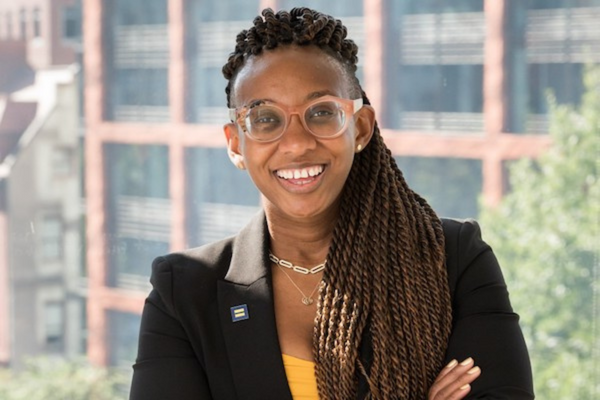Kelley Robinson is the real deal.
A “community organizer for life,” she cut her teeth on the Obama presidential campaign in Missouri and as Executive Director of the Planned Parenthood Action Fund. She cites Bayard Rustin, Marsha P. Johnson, and Sylvia Rivera as inspirations, and she believes deeply in centering those at the margins.
She believed it was a “critical misstep” any time Planned Parenthood didn’t “focus on the people that are most at the margins as being the center of the fight,” referencing Black women and trans folks accessing abortion care. “I was really proud to be a part of the work that was about learning from those mistakes in envisioning a different future. And I think that’s what I bring to the Human Rights Campaign.”
Robinson took the helm of the Human Rights Campaign (HRC), the 42-year old national LGBTQ+-rights organization with over three million members, in November. She is the first Black, queer woman to lead the organization.
“Being Black, being queer, being a mom, being a person of faith—They’ve defined who I am in this world,” Robinson says. “And I think by showing up as my whole self, showing up as somebody that’s interested in collaborating, and also showing up as somebody that’s part of a legacy of freedom fighting, that’s a powerful thing, and I hope it’s just another way that people see themselves reflected.” She adds: “I better be the first and not the last.”
The HRC has a history of not centering those at the margins, notably for supporting a trans-exclusive version of the Employment Non-Discrimination Act in 2007. The organization has made efforts in years since to become more progressive, launching initiatives such as the Trans Justice Initiative. But in 2019, trans leaders wrote an open letter to the organization’s cisgender leadership saying that they were not being included in this “trans-centered” approach and that they needed to be listened to and further repair was needed.
“Every day I’m thinking about the privileges that I bring to the role, especially as a cisgender woman living here in Washington, DC, I have to be mindful of that too, and how I use my own privilege to create more space for people,” Robinson acknowledges. “I hope the next president of this organization is a trans person, I hope it’s a trans person of color, but we’ve got to do work to make sure that we are continuing to build our leadership pipeline and open the door even further so that every person that cares about this issue and work can see themselves in this role.”
Her vision for the HRC is that “every single member of the LGBTQ+ community sees themselves within this organization and this work. And I think our job is not to be telling people about it, but to be doing it in a way that people can see, feel, and experience every day. And in my short time at HRC, I’ve seen that in action and I’m really proud of it.”


